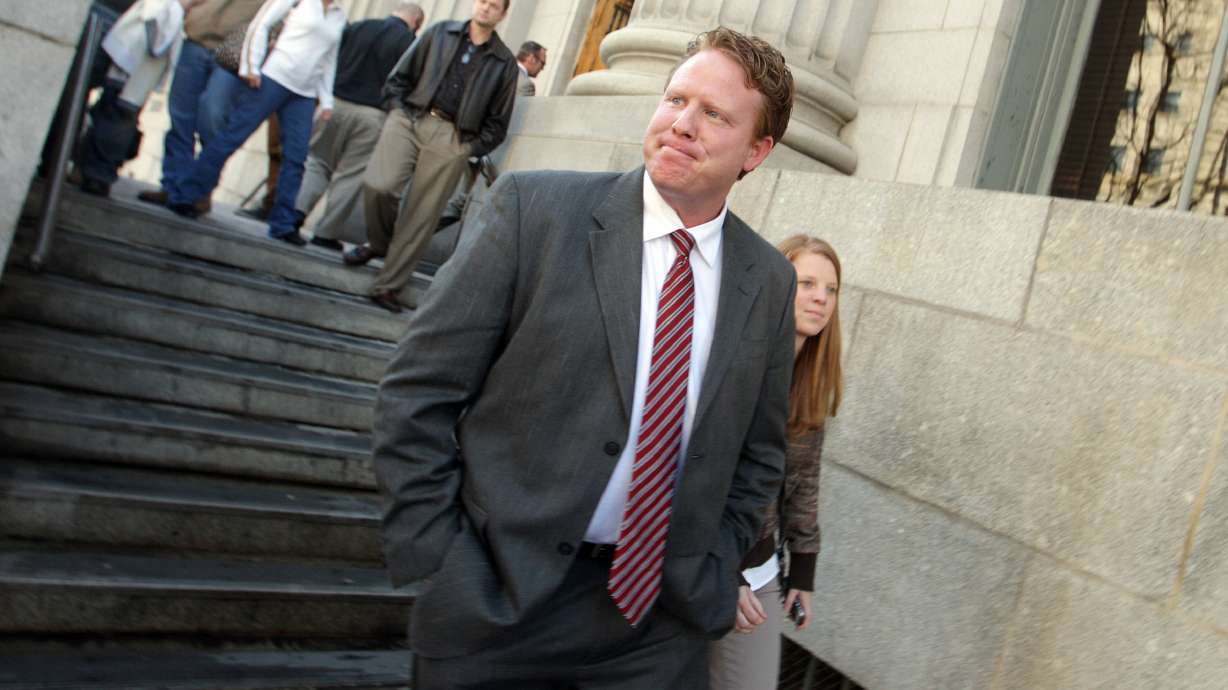Estimated read time: 5-6 minutes
This archived news story is available only for your personal, non-commercial use. Information in the story may be outdated or superseded by additional information. Reading or replaying the story in its archived form does not constitute a republication of the story.
SALT LAKE CITY — In a final plea to jurors to convict ex-millionaire Jeremy Johnson and two business partners of fraud and money laundering, prosecutors said the men built a wall of shell corporations around Johnson's failing business in order to keep money flowing in.
"This was a sham, a complete lie," assistant U.S. attorney Jason Burt said during closing arguments Thursday. "These defendants used their employees, they used their families and they used their friends to accomplish this scheme to benefit themselves."
Johnson, along with former business partners Scott Leavitt and Ryan Riddle, stand accused in an 86-count indictment alleging conspiracy, bank fraud, wire fraud and money laundering in connection with Johnson's once prosperous Internet marketing company, iWorks.
When that company began to crumble under an onslaught of credit card chargebacks, prompting banks to start closing iWorks' accounts, prosecutors say Johnson and his partners opened 37 shell corporations to divert business through and keep the company from buckling. The shell companies were set up in the names of employees, family or friends, and were used to set up 281 merchant accounts at Wells Fargo to process iWorks customers' credit card transactions.
"They lied deliberately on every one of these applications because they knew that their business was over if they couldn't obtain new merchant accounts," Burt said.
By comparison, a company as large as Amazon has only one merchant account, Burt noted.
Johnson, who is representing himself after dismissing his third set of lawyers in December, is expected to make a closing statement Friday before jurors begin deliberating.
Since accusations first came against Johnson five years ago, the St. George native has denied any wrongdoing. He told jurors last week that his business model was transparent and that the card processing company he was working with, CardFlex, was aware of how he was operating.
Burt said the "calculated, intentional and deceitful plan" to establish multiple corporations and move money between them whenever it looked like one was in trouble formed months before iWorks started doing business with CardFlex.
Burt reviewed a series of emails between the three defendants and others in the company, which he said showed clear evidence the men were well aware of the conspiracy they were orchestrating.
"This will only work if the acquiring bank doesn't recognize iWorks," Riddle wrote to Leavitt in one message.
Related:
Other emails discussed a need to identify more people who could back corporations as the initial accounts came under scrutiny. In multiple exchanges, Burt said, Johnson is documented emphasizing the need for "backup accounts."
In another discussing a testy exchange with a CardFlex representative, Johnson said, "I do not want anyone to know about this plan that does not need to know."
Emails from iWorks' attorney at the time said that "iWorks is committing a federal crime." Another message sent later advised against forming any more corporations.
Defending Leavitt, defense attorney Marcus Mumford praised his client and his co-defendants as champions of liberty, contending that Leavitt's efforts to ensure the company's taxes got paid show he had nothing to hide.
"Who launders money so that they can pay taxes?" Mumford asked.
When it comes to documentation establishing the corporations, Mumford also argued that no evidence had been presented that it was Leavitt who filled out forms with information that prosecutors say was falsified.
Mumford also touted Johnson's personal guarantee and the wealth at the time that he had backing the business deals, all of which Mumford said disputes prosecutors' claims that the men were trying to keep Johnson's name from being associated with the new corporations.
Riddle, also acting as his own attorney, became emotional at one point during his closing presentation as he asked jurors to consider the intent behind his and his business partners' actions: keeping their business afloat.
"The reality is, iWorks wasn't the only company being hit by these things," Riddle said, noting that he couldn't go into details determined to be irrelevant for trial about the chargeback issue.
The company, which had outgrown its leadership structure, was going through a difficult period, Riddle said. He acknowledged that some of the email messages entered into evidence are difficult to decipher so many years later, and "without context," appear unflattering.
However, he insisted that while the business was imperfect, it was not illegal.
Riddle argued that the successful businessmen he had worked with for nine years did not "become fraudsters overnight," but were attempting to run the company the best they could.
"I know myself, and I know the guys I worked with," Riddle said.
He went on to add that he didn't leave iWorks because he thought the company was coming apart. "I quit because I was tired."
After the jury hands down a verdict, Johnson is scheduled to turn around and defend himself in a parallel civil trial regarding iWorks in Las Vegas set to begin March 28.
Johnson had attempted to call former Utah Attorneys General John Swallow and Mark Shurtleff — who face criminal charges accusing them of trading favors during their time in office for preferential treatment — as witnesses in his trial because he claims they had once declared his business legitimate. But U.S. District Judge David Nuffer barred him from mentioning the two former attorneys general.
Johnson is a key figure in the cases against Shurtleff and Swallow.
Last month the Federal Elections Commission named Swallow in allegations that in 2009 Johnson made illegal campaign contributions to Shurtleff, Sen. Mike Lee, R-Utah, and then-Senate Majority Leader Harry Reid, D-Nevada.










